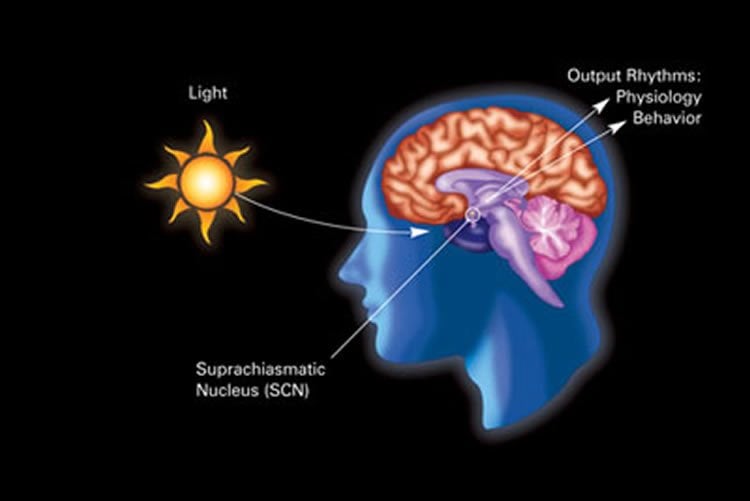Summary: Findings provide additional insight into how the circadian clock regulates physiological function.
Source: McGill University Health Center.
Discovery could lead to ways to mitigate effects of jet lag and shift work.
The brain’s biological clock stimulates thirst in the hours before sleep, according to a study published in the journal Nature by researchers from the Research Institute of the McGill University Health Centre (RI-MUHC).
The finding – along with the discovery of the molecular process behind it – provides the first insight into how the clock regulates a physiological function. And while the research was conducted in mice, “the findings could point the way toward drugs that target receptors implicated in problems that people experience from shift work or jet lag,” says the study’s senior author, Charles Bourque, a professor in McGill’s Department of Neurology and scientist at the Brain Repair and Integrative Neuroscience Program at the (RI-MUHC).
Scientists knew that rodents show a surge in water intake during the last two hours before sleep. The study by Bourque’s group revealed that this behavior is not motivated by any physiological reason, such as dehydration. So if they don’t need to drink water, why do they?
The team of researchers, which included lead author and Ph.D. student Claire Gizowski, found that restricting the access of mice to water during the surge period resulted in significant dehydration towards the end of the sleep cycle. So the increase in water intake before sleep is a preemptive strike that guards against dehydration and serves to keep the animal healthy and properly hydrated.
Then the researchers looked for the mechanism that sets this thirst response in motion. It’s well established that the brain harbors a hydration sensor with thirst neurons in that sensor organ. So they wondered if the SCN (suprachiasmatic nuclei), the brain region that regulates circadian cycles – a.k.a. the biological clock – could be communicating with the thirst neurons.
The team suspected that vasopressin, a neuropeptide produced by the SCN, might play a critical role. To confirm that, they used so-called “sniffer cells” designed to fluoresce in the presence of vasopressin. When they applied these cells to rodent brain tissue and then electrically stimulated the SCN, Bourque says, “We saw a big increase in the output of the sniffer cells, indicating that vasopressin is being released in that area as a result of stimulating the clock.”

To explore if vasopressin was stimulating thirst neurons, the researchers employed optogenetics, a cutting-edge technique that uses laser light to turn neurons on or off. Using genetically engineered mice whose vasopressin neurons contain a light activated molecule, the researchers were able to show that vasopressin does, indeed, turn on thirst neurons.
“Although this study was performed in rodents, it points toward an explanation as to why we often experience thirst and ingest liquids such as water or milk before bedtime,” Bourque says. “More importantly, this advance in our understanding of how the clock executes a circadian rhythm has applications in situations such as jet lag and shift work. All our organs follow a circadian rhythm, which helps optimize how they function. Shift work forces people out of their natural rhythms, which can have repercussions on health. Knowing how the clock works gives us more potential to actually do something about it.”
Funding: This research was supported by the Canadian Institutes of Health Research and the Fonds de Recherche du Québec – Santé.
Source: McGill University Health Center
Image Source: This NeuroscienceNews.com image is credited National Institute of General Medical Sciences and is in the public domain.
Original Research: Abstract for “Clock-driven vasopressin neurotransmission mediates anticipatory thirst prior to sleep” by C. Gizowski, C. Zaelzer and C. W. Bourque in Nature. Published online September 28 2016 doi:10.1038/nature19756
[cbtabs][cbtab title=”MLA”]McGill University Health Center. “Brain’s Biological Clock Stimlates Thirst Before Sleep.” NeuroscienceNews. NeuroscienceNews, 29 September 2016.
<https://neurosciencenews.com/sleep-thirst-circadian-clock-5152/>.[/cbtab][cbtab title=”APA”]McGill University Health Center. (2016, September 29). Brain’s Biological Clock Stimlates Thirst Before Sleep. NeuroscienceNews. Retrieved September 29, 2016 from https://neurosciencenews.com/sleep-thirst-circadian-clock-5152/[/cbtab][cbtab title=”Chicago”]McGill University Health Center. “Brain’s Biological Clock Stimlates Thirst Before Sleep.” https://neurosciencenews.com/sleep-thirst-circadian-clock-5152/ (accessed September 29, 2016).[/cbtab][/cbtabs]
Abstract
Clock-driven vasopressin neurotransmission mediates anticipatory thirst prior to sleep
Circadian rhythms have evolved to anticipate and adapt animals to the constraints of the earth’s 24-hour light cycle. Although the molecular processes that establish periodicity in clock neurons of the suprachiasmatic nucleus (SCN) are well understood, the mechanisms by which axonal projections from the central clock drive behavioural rhythms are unknown. Here we show that the sleep period in mice (Zeitgeber time, ZT0–12) is preceded by an increase in water intake promoted entirely by the central clock, and not motivated by physiological need. Mice denied this surge experienced significant dehydration near the end of the sleep period, indicating that this water intake contributes to the maintenance of overnight hydromineral balance. Furthermore, this effect relies specifically on the activity of SCN vasopressin (VP) neurons that project to thirst neurons in the OVLT (organum vasculosum lamina terminalis), where VP is released as a neurotransmitter. SCN VP neurons become electrically active during the anticipatory period (ZT21.5–23.5), and depolarize and excite OVLT neurons through the activation of postsynaptic VP V1a receptors and downstream non-selective cation channels. Optogenetic induction of VP release before the anticipatory period (basal period; ZT19.5–21.5) excited OVLT neurons and prompted a surge in water intake. Conversely, optogenetic inhibition of VP release during the anticipatory period inhibited the firing of OVLT neurons and prevented the corresponding increase in water intake. Our findings reveal the existence of anticipatory thirst, and demonstrate this behaviour to be driven by excitatory peptidergic neurotransmission mediated by VP release from central clock neurons.
“Clock-driven vasopressin neurotransmission mediates anticipatory thirst prior to sleep” by C. Gizowski, C. Zaelzer and C. W. Bourque in Nature. Published online September 28 2016 doi:10.1038/nature19756






